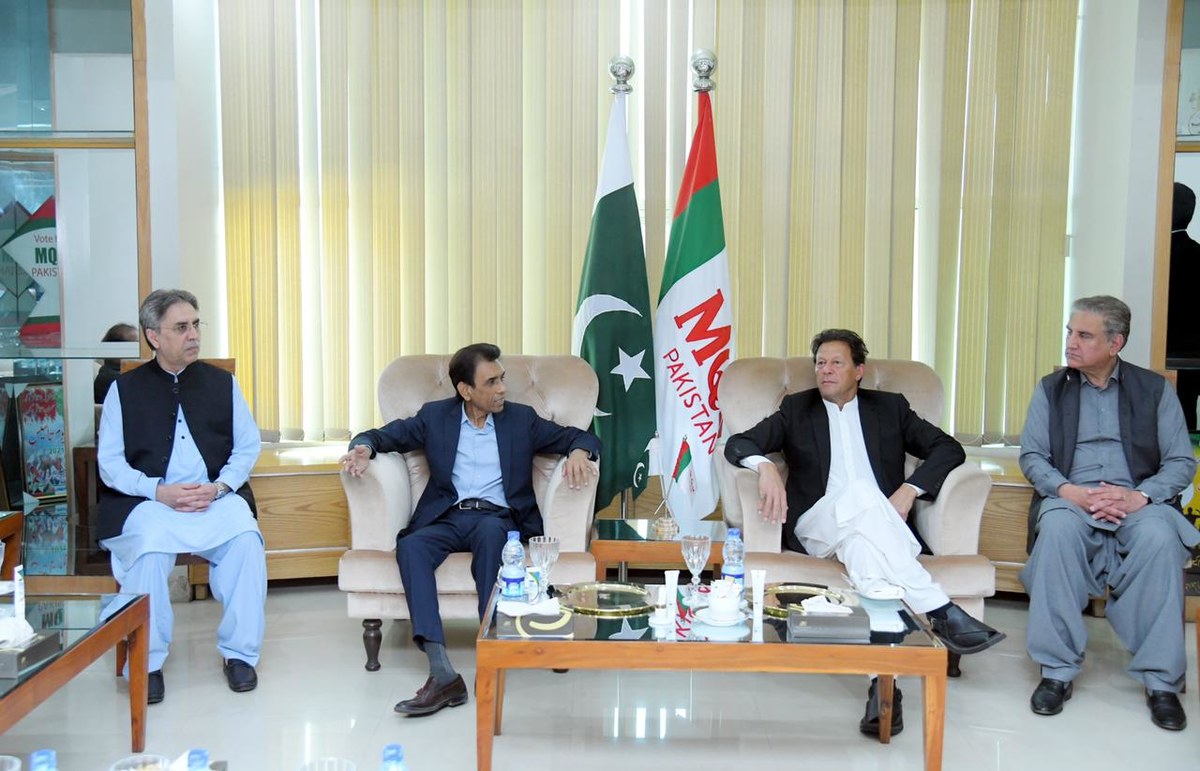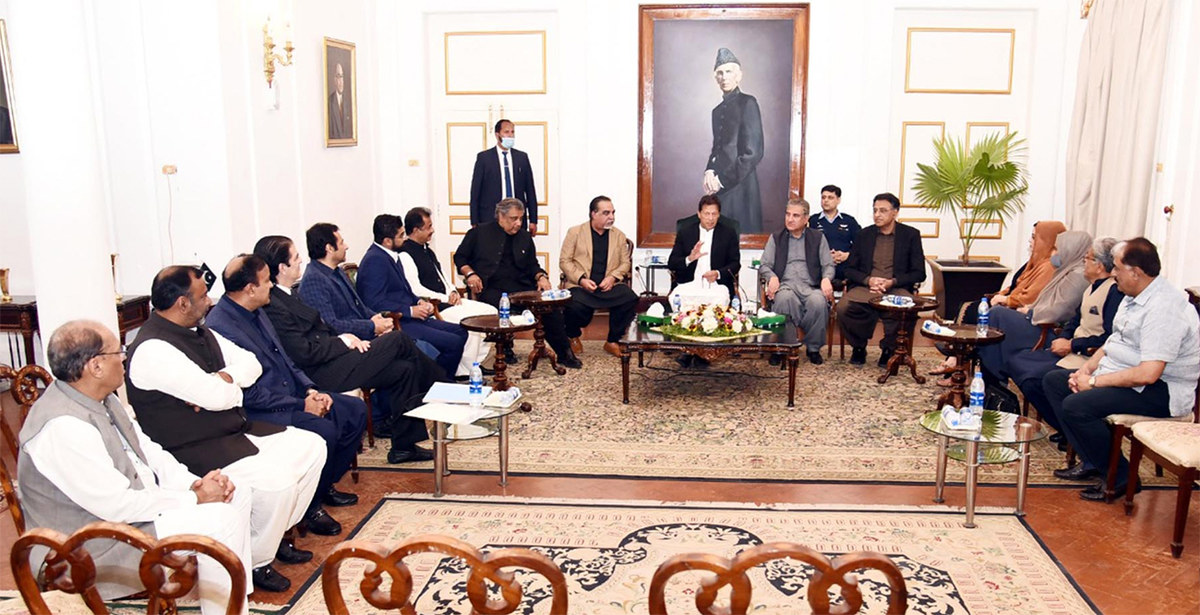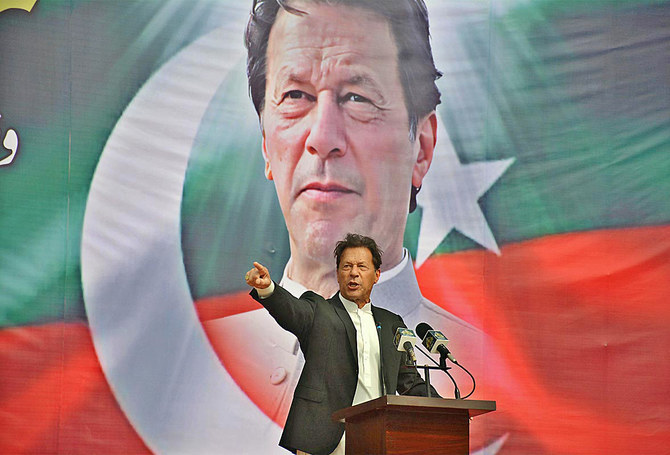KARACHI: Prime Minister Imran Khan on Wednesday described a no-confidence motion against him as “the political death of opposition” in a fiery speech which he delivered after meeting his coalition partners based in Pakistan’s southern Sindh province.
The prime minister flew to Karachi to interact with the top leaders of Muttahida Qaumi Movement-Pakistan (MQM-P) and Grand Democratic Alliance (GDA) after the opposition filed a no-trust motion in the National Assembly against him that can lead to the fall of his government.
Following the submission, Khan scrambled to meet his senior party leaders, the attorney general of Pakistan and chief minister of Punjab, Usman Buzdar, whose removal from office has been sought by both opposition parties and disgruntled groups within the ruling party who accuse him of poor governance and mismanagement of the economy of Punjab, the country’s largest, richest and most populous province.
“The no-confidence motion is the political death of opposition,” the prime minister told his supporters at the Sindh Governor House after meeting his coalition partners.
He also accused the opposition Pakistan Peoples Party (PPP) of bribing the ruling Pakistan Tehreek-e-Insaf (PTI) lawmakers in the National Assembly.
“One of our MNAs has been offered Rs200 millions,” Khan said, adding the top PPP leader Asif Ali Zardari was now going to be his “prime target.”
“These [opposition] thieves are sucking the blood of the country for the last thirty years but they say they have come out to save it. They are afraid of Imran Khan,” he continued.
The prime minister maintained he was criticized for delivering a scathing speech against the European Union since the opposition leaders had stashed their wealth in Western countries.
“Pakistan needs to be on friendly terms with everyone,” he added. “But I will not allow any country to work against the interests of my state. I have said nothing to the European Union, though I reminded them that we had participated in their war [in Afghanistan] and lost 80,000 people. The conflict also destroyed our tribal areas and displaced its 3.5 million residents. No one appreciated us or said thank you.”
Khan warned the opposition he would not stop after surviving the no-trust move, adding that he would go after its leaders.
Prior to his speech, one of his close aides and the foreign minister of the country, Shah Mahmood Qureshi, said the prime minister had met his coalition partners to assess the “current political situation” and discuss a “joint strategy.”

Pakistani Prime Minister Imran Khan (2nd from R) speaks to MQM convener Khalid Maqbool Siddiqui (2nd from L) in Karachi on March 9, 2022. (PM Office)
“The MQM assured the prime minister of its full support,” Qureshi told the media in a brief interaction, though the MQM-P leaders rejected the claim.
“Neither did the Prime minister ask for and nor did we offer him any assurances,” Dr. Khalid Maqbool clarified in his media talk.
Another MQM-P leader Amir Khan said his party was a government ally, but it had kept its options open.
“The opposition has not contacted us to discuss the vote of confidence,” he said, “though our options remain open.”
Khan also met GDA leaders, including Nusrat Sehar Abbasi, who belongs to the Pakistan Muslim League-Functional (PML-F), but her party’s influential leader, Pir Sibghatullah Rashdi, said he could not meet the PM due to his “ailing health.”

Pakistani Prime Minister Imran Khan (center) meets GDA leaders in Karachi, Pakistan, on March 9, 2022. (PID)
Meanwhile, Khan’s ruling PTI party suffered a setback in Sindh when it lost a Senate seat from the province which recently fell vacant after the disqualification of one of its leaders, Faisal Vawda.
The seat was won by PPP’s Nisar Ahmed Khuhro, as Chief Minister Murad Ali Shah revealed that at least four PTI leaders voted in Khuhro’s favor.
Commenting on the overall political situation in the country since the filing of the no-confidence motion, senior political analyst Mazhar Abbas said the government’s coalition partners would continue to evaluate the situation and refuse to weigh in with the opposition “if there is a slight chance that the no-trust vote will fail.”
Abbas added the purpose of the prime minister’s visit was not just to meet his allies but also resolve the internal disputes within his own party.
“There are reports that four to five PTI members of National Assembly from Sindh could vote against him,” he said. “Khan’s visit is also aimed at stopping them and others from switching sides.”
However, the country’s information minister Chaudhry Fawad Hussain sounded confident during a news conference in the federal capital in which he urged the National Assembly speaker to convene the next session of the house since Pakistan could not afford political uncertainty.
He maintained the government had the support of 179 lawmakers, adding that five more assembly members were also likely to join the PTI administration.
“We need political stability [in Pakistan],” Hussain told the news conference. “We are requesting him [the National Assembly speaker] not to linger this on. Process the no-confidence motion as soon as possible since the country cannot afford a protracted political crisis.”


















